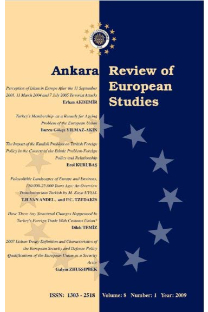THE REPRESENTATION OF THE TURKISH ARMED FORCES IN THE PRESS DURING TURKEY’S EU MEMBERSHIP PROCESS: The Case of the 2 November 2004 Press Briefing
Türk Silahlı Kuvvetleri’nin TSK toplumla ilişkisi ve bu ilişkinin siyasal alana etkileri ulusal ve uluslararası kitle iletişim araçları için özel bir anlama sahiptir. Bu nedenle Türkiye’nin AB üyelik sürecinde demokratikleşmesiyle ilgilenen gözlemciler için TSK’nın açıklamaları ve bu açıklamaların medyada temsilini yakından izlemektedirler. Bu çalışma, üyelik sürecinde TSK açıklamalarının Türk medyasında temsilinin taşıdığı anlamı ortaya koymak için Türkiye ile müzakerelerin başlaması sürecinde, TSK tarafından 2 Kasım 2004’te gerçekleştirilen tek basın brifinginin “macro yapısal söylem çözümlemesi” yöntemi kullanılarak yapılmıştır. Bu çözümleme iki varsayım içermektedir. İlki, TSK, basın brifinglerini, kurumsal iletişiminin bir parçası olarak mesajlarını halka ulaştırmak için düzenler. Medyada yer alan bu brifinglerin kapsamı sermaye ilişkileri kadar medya politikaları tarafından belirlenir. İkincisi, gazeteler arasındaki farklara rağmen bütün medya kurumları bu süreçte TSK’nın tavrını önemli bir değişken olarak düşünür. Çalışmanın bulguları her iki varsayımı da desteklemektedir
Anahtar Kelimeler:
Ordu, asker, medya, kurumsal iletişim, Avrupa Birliği, haber
THE REPRESENTATION OF THE TURKISH ARMED FORCES IN THE PRESS DURING TURKEY’S EU MEMBERSHIP PROCESS: The Case of the 2 November 2004 Press Briefing
The relationship of the Turkish Armed Forces TAF to the society and the implications of this relationship for the political sphere have a special meaning to the national and international media. The observers interested in the level of democratization under the EU membership process follow closely both the statements of the TAF and their representation in the media. The interest in the TAF’s communication with the public flows from two sources: First, how the TAF, the self-declared founder and guardian of the nation state, will position itself in Turkey’s EU membership process draws attention to its public declarations because this process involves substantial transformation of sovereignty in numerous areas. Second, the reaction of the TAF to the EU’s demands on the reorganization of civil military relations puts the TAF in a delicate position, for the reforms have forced it to relinquish its hold over power. To gain a grasp of the way the Turkish media represents the TAF’s statements in this process, this paper studies a crucial case by employing “macro structural discourse analysis,” i.e., the press briefing organized by the TAF on November 2, 2004, which is the only press briefing in the process leading to the EU’s decision to launch accession talks with Turkey. The analysis here is based on two assumptions. First, the TAF organizes press briefings to convey its message to the public as part of its institutional communication practices. The coverage of those briefings by various media outlets is shaped by the publication policies as well as their relationship to the capital. Second, despite this variation across newspapers, all media institutions consider the TAF’s attitude in this process as a crucial variable. The findings of the study lend empirical support to both assumptions
Keywords:
Army, soldier, media, institutional communication, European Union, news,
___
Thomas P.M. BARNETT, The Pentagon’s New Map, New York, Putnam Pub.,2004.Ümit CİZRE, “Egemen, İdeoloji ve Türk Silahlı Kuvvetleri: Kavramsal ve İlişkisel Bir Analiz”, A. İnsel, A. Bayramoğlu (ed.). Bir Zümre, Bir Parti Türkiye’de Ordu. (pp. 135-161). İstanbul: Birikim Yayınları, 2004.
H. GÖKTAŞ and M. GÜLBAY, Kışladan Anayasaya Ordu, İstanbul, Metiş Yayınları, 2004.
D. HALBERSTAM, Barış Zamanı Savaş, İstanbul, İş Bankası Kültür Yayınları, 2002.
W. HALE, , Türkiye’de Ordu ve Siyaset, İstanbul, Hil Yayınları, 1996.
S. P. HUNTINGTON, Asker ve Devlet, İstanbul, Salyangoz Yayınları, 2004.
S. IRVAN, “Metin Çözümlemelerinde Yöntem Sorunu”, Medya ve Kültür, Ankara, 1. Ulusal Sempozyumu Bildirileri, 2000.
I. NEZİROĞLU, Türkiye’de Askeri Müdaheleler ve Basın, Ankara, Türk Demokrasi Vakfı Yayınları, 2003.
P. SHOEMAKER, S.D. REESE, “İdeolojinin Medya İçeriği Üzerindeki Etkisi”, S. Irvan (ed.). Medya Kültür Siyaset, Ankara, Ark Yayınları, 2003. pp. 99-136.
- ISSN: 1303-2518
- Yayın Aralığı: Yılda 2 Sayı
- Başlangıç: 2001
- Yayıncı: Ankara Üniversitesi Avrupa Toplulukları Araştırma ve Uygulama Merkezi
Sayıdaki Diğer Makaleler
Avrupa Birliği’nin Açık Toplum İdealine Karşı Direnme Hakkı: 1982 Anayasası’nın İktisadi Hükümleri
ENVIRONMENTAL TENDENCY OF CONSUMERS TOWARD SUSTAINABLE LIFE
TÜRKİYE AVRUPA BİRLİĞİ İLİŞKİLERİNİ EGEMENLİK DEVRİ TARTIŞMALARI ÜZERİNDEN OKUMAK
Soğuk Savaş Döneminde Avrupa’da Ortak Dış Politika Oluşturma Çabaları
Türkiye Avrupa Birliği İlişkilerini Egemenlik Devri Tartışmaları Üzerinden Okumak
Avrupa Birliği’nin açık toplum idealine karşı direnme hakkı:1982 Anayasası’nın iktisadi hükümleri
ARBEITNEHMER-MITBESTIMMUNG IN DER EUROPÄISCHEN AKTIENGESELLSCHAFT SE
